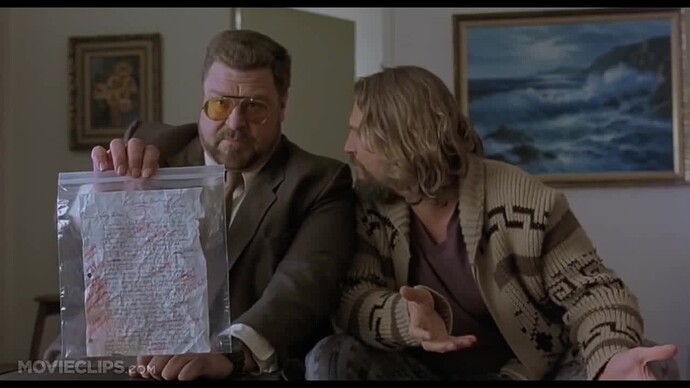I love the Quotes. It’s people far more eloquent than myself saying it better than I can.
And it’s all the upright people who have ever lived, winning this thing, together, with me, right now.
"Now, then,” said Joan to the waiting battalions, “the place is yours—enter in! Bugles, sound the assault! Now, then—all together—go!”
And go it was. You never saw anything like it. We swarmed up the ladders and over the battlements like a wave—and the place was our property. Why, one might live a thousand years and never see so gorgeous a thing as that again."
From “Personal Recollections of Joan of Arc”, by Mark Twain, 1896
I began writing this series of articles, entitled “Positive Changes That Are Occurring”, in July of 2013. At some point, I began to use a quote at the beginning of each one. As I compiled my article “2020, the Year in Review”, I began to compile all the quotes I’d used that year. I’m eventually going to get through all of my articles, and integrate the remainder, and the quotes document will not only introduce the data but also stand on its own, as well.
It’s a “teach a person to think” kind of thing.
Jeff Miller, Brooklyn, New York, January 2021
“For there is but one essential justice which cements society, and one law which establishes this justice. This law is right reason, which is the true rule of all commandments and prohibitions. Whoever neglects this law, whether written or unwritten, is necessarily unjust and wicked.”
― From “On the Laws”, by Marcus Tullius Cicero, 43 B.C.
I see faces and traces of home back in New York City
So you think I’m a tough kid? Is that what you heard?
Well I like to see some action and it gets into my blood
The call me the trail blazer - Rael-electric razor
I’m a pitcher in a chain gang, we don’t believe in pain
'Cos we’re only as strong, as the weakest link in the chain
Let me out of Pontiac when I was just seventeen
I had to get it out of me, if you know what I mean, what I mean
You say I must be crazy, 'cos I don’t care who I hit, who I hit
But I know it’s me that’s hitting out, and I’m not full of shit
I don’t care who I hurt, I don’t care who I do wrong
This is your mess I’m stuck in, I really don’t belong
When I take out my bottle, filled up high with gasoline
You can tell by the night fires where Rael has been, has been
From “Back in N.Y.C.”, by Peter Brian Gabriel / Anthony Banks / Phil Collins / Steve Hackett / Michael Rutherford, 1974
(Jeff Miller, in Brooklyn, New York, Covin-19 lockdown, 2020)
In the photo immediately above, I’m standing with the 1984 Ritchey Commando that I was riding in Pittsburgh, Pennsylvania in 2016 when the MK-multiple agency wetworker ran the red light in Pittsburgh and T-boned me. I flew ten feet, maybe 15. It made a sound like a cannon, “boom!”
There were no bent tubes or stays on my bike. The bottom bracket, which took the brunt of the impact (into my right crank), spun perfectly, and still does. It was not touched by a mechanic, then to now. For those unaware, that’s not scientifically possible. In that, when bikes wreck in bike races, they “pretzel”. The tubes on a bike are strong longitudinally, but weak like a noodle when impacted laterally.
The car was going 41 or 42 mph when it hit me. I know because I drove down that street the next day at the speed I saw her going, and looked at my speedometer to confirm it.
As I got up off the pavement, she looked at me with wide eyes and said “you are very strong”.
I put the chain back on the bike and rode home. The tires didn’t even blow.
When I got home, I walked in, held up my arms, and said to my wife “I’m totally fine…I just got hit by a car.” Without pause, she said “I thought when you said goodbye ‘he’s going to be hit by a car’…but I didn’t want to be a downer and say such a thing”.
There’s just a few scratches on the paint of the bike. I had a little cut on my shin, I think a theatrical detail thrown in to make the whole situation seem a bit less impossible. I went to the hospital the next day. No bruising. No injuries of any kind. I wasn’t even sore.
An entity I cannot name bent the laws of space/time for me, I’m guessing because such an assault was immoral, and thus refutable by an entity with such power. I don’t know who it was but I thank them for it. My guess is Athena, goddess of war and sacred quests. Or perhaps the Devil, himself, to stir the pot and keep things interesting.
At first, the Insurance company said I was guilty, had run a red light! Then they called me back, and offered to settle, because she’d admitted she’d made up everything she’d said in her statement. I bought the Cook Bros. crank arms you see here with the $500 settlement.
When I have cash later I’ll reenact the accident, with a donor bike, and one of my cars that’s correct for that challenge. And we’ll see what happens to the bike.
Sprawling on the fringes of the city
In geometric order
An insulated border
In-between the bright lights
And the far, unlit unknown
Growing up, it all seems so one-sided
Opinions all provided
The future pre-decided
Detached and subdivided
In the mass-production zone
Nowhere is the dreamer
Or the misfit so alone
Subdivisions
In the high school halls
In the shopping malls
Conform or be cast out
Subdivisions
In the basement bars
In the backs of cars
Be cool or be cast out
Any escape might help to smooth
The unattractive truth
But the suburbs have no charms to soothe
The restless dreams of youth
From “Subdivisions" by Rush, written by Alex Zivojinovich / Gary Lee Weinrib / Neil Elwood Peart, 1982
“As my sufferings mounted, I soon realized that there were two ways in which I could respond to my situation – either to react with bitterness or seek to transform the suffering into a creative force. I decided to follow the latter course.”
― Martin Luther King Jr.
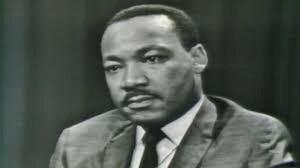
(Martin Luther King, Jr.)
I rolled on, the sky grew dark
I put the pedal down to make some time
There’s something good waitin’ down this road
I’m pickin’ up whatever’s mine
I’m runnin’ down a dream that never would come to me
Workin’ on a mystery, goin’ wherever it leads
Runnin’ down a dream
Yeah, I’m runnin’ down a dream that never would come to me
Workin’ on a mystery, goin’ wherever it leads
I’m runnin’ down a dream
From “Runnin’ Down a Dream”, by Tom Petty, 1989
My shit is real, I had to pioneer in this
Around the way, all the fake niggaz fear this
Paragraphs bust your membrane
On and on I bust through like teflon
Prodigy, from Mobb Deep’s “Me and My Crew”, 1991
(Mobb Deep: Albert Johnson, aka “Prodigy” (left), Kejuan Waliek Muchita, aka “Havoc” (right). Both Prodigy and Havoc are making purportedly secret Masonic gestures of recognition, Prodigy with his right hand with thumb extended, Havoc with his right hand, with the pointing finger.)
“For there is but one essential justice which cements society, and one law which establishes this justice. This law is right reason, which is the true rule of all commandments and prohibitions. Whoever neglects this law, whether written or unwritten, is necessarily unjust and wicked.”
― From “On the Laws”, by Marcus Tullius Cicero, 52 A.D.
“In the following pages I offer nothing more than simple facts, plain arguments, and common sense; and have no other preliminaries to settle with the reader, than that he will divest himself of prejudice and repossession, and suffer his reason and feelings to determine for themselves; and that he will put on, or rather that he will not put off, the true character of man, and generously enlarge his view beyond the present day.”
- Thomas Paine
“Now, I make a point of never having any prejudices, and of following docilely wherever fact may lead me.“
Sherlock Holmes, from “The Adventure of the Reigate Squire”, by Sir Arthur Conan Doyle, 1893
“The fact that it is a hypothesis specially uncongenial to the emotions of this investigator or that, is neither here nor there.”
― From “That Hideous Strength”, by C.S. Lewis, 1945
“I think Jeff is wise to include the same intro paragraphs at the beginning of each posting because the enemy established this long con by repeating the same erroneous claims and constantly reinforces them with their memes. Maybe it needs to be undone the same way in the record. I think it worked pretty well for them during the years when their weather weaponry was all working and the earth was turning into a desert at an accelerating rate, before orgonite suddenly proliferated in this century’s beginning. Carol and are are still ‘baffled’ that Jeff Miller is the only person on the planet, out of five or so billion souls, who collects and publishes solid, statistical evidence that the tide has turned forcefully against the parasitic world order and their ‘Gaia destruction’ agenda.”
Don Croft on his Etheric Warriors forum, October, 2015
“Honest pioneer work in the field of science has always been, and will continue to be, life’s pilot. On all sides, life is surrounded by hostility. This puts us under an obligation.”
- Wilhelm Reich
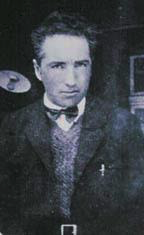
(Wilhelm Reich)
(Wilhelm Reich’s mug shot - 1956. Reich died only two weeks from his parole date. His official cause of death was listed as a heart attack. On her last visit, Reich told his lawyer that he had asked for aspirin and been given two pink pills instead.)
“The high object of our mission, the consciousness that it was unselfish and chivalrous, the villainous character of our opponent, all added to the sporting interest of the adventure. Far from feeling guilty, I rejoiced and exulted in our dangers.”
Dr. John H. Watson, from “The Adventures of Charles August Milverton”, by Sir Arthur Conan Doyle, 1904
“jeff miller’s good news etheric warriors threat”
From an Orgonite forum in another country, October 2018
The author was briefly an Etheric Warriors member, but was ejected by Don after I used linguistic analysis to prove that said member was a double agent. Here, they’re pretending that they tried to say “thread”, but misspoke. This is a classic example of the “so sorry, English isn’t my first language!” spook writing technique.
Don taught me to never call my detractors by name.
“You’re definitely standing on your own and in your own class. It’s a good thing to be the first as long as they don’t kill us for it.”
Don Croft to Jeff Miller in an e-mail on January 17, 2018
Watcher of the skies, watcher of all
His is a world alone, no world is his own
He whom life can no longer surprise
Raising his eyes beholds a planet unknown
Tony Banks and Michael Rutherford, from “Watcher of the Skies”, from “Foxtrot”, by Genesis, 1972
Then felt I like some watcher of the skies
When a new planet swims into his ken.
From “On First Looking into Chapman’s Homer”, by John Keats, 1817
"I like the scientific spirit—the holding off, the being sure but not too sure, the willingness to surrender ideas when the evidence is against them: this is ultimately fine—it always keeps the way beyond open—always gives life, thought, affection, the whole man, a chance to try over again after a mistake—after a wrong guess.”
― Walt Whitman, Walt Whitman’s Camden Conversations, 1895

(Walt Whitman)
“It is by logic that we prove, but by intuition that we discover”.
- From “Science et méthode”, by the French Physicist and Mathematician Henri Poincare 1908
“Very science has for its basis a system of principles as fixed and unalterable as those by which the universe is regulated and governed. Man cannot make principles; he can only discover them.”
From “The Age of Reason, Part One”, by Thomas Paine, 1794
“The only ethical principle which has made science possible is that the truth shall be told all the time. If we do not penalize false statements made in error, we open up the way for false statements by intention. And a false statement of fact, made deliberately, is the most serious crime a scientist can commit.”
From “Gaudy Night”, by Dorothy L. Sayers, 1935
“Education without values, as useful as it is, seems rather to make man a more clever devil.”
– From “The Abolition of Man”, by C. S. Lewis, 1943
“The real voyage of discovery consists not in seeking new landscapes, but having new eyes.”
- Marcel Proust
As you are aware, Watson, there is no one who knows the higher criminal world of London so well as I do. For years past I have continually been conscious of some power behind the malefactor, some deep organizing power which forever stands in the way of the law, and throws its shield over the wrong-doer. Again and again in cases of the most varying sorts—forgery cases, robberies, murders—I have felt the presence of this force, and I have deduced its action in many of those undiscovered crimes in which I have not been personally consulted. For years I have endeavored to break through the veil which shrouded it, and at last the time came when I seized my thread and followed it, until it led me, after a thousand cunning windings, to ex-Professor Moriarty of mathematical celebrity.
He is the Napoleon of crime, Watson. He is the organizer of half that is evil and of nearly all that is undetected in this great city. He is a genius, a philosopher, an abstract thinker. He has a brain of the first order. He sits motionless, like a spider in the center of its web, but that web has a thousand radiations, and he knows well every quiver of each of them. He does little himself. He only plans. But his agents are numerous and splendidly organized. Is there a crime to be done, a paper to be abstracted, we will say, a house to be rifled, a man to be removed—the word is passed to the Professor, the matter is organized and carried out. The agent may be caught. In that case money is found for his bail or his defense. But the central power which uses the agent is never caught—never so much as suspected. This was the organization which I deduced, Watson, and which I devoted my whole energy to exposing and breaking up.
From “The Memoirs of Sherlock Holmes - The Final Problem”, by Sir Arthur Conan Doyle, 1893
“Sail away from the safe harbor. Catch the trade winds in your sails. Explore. Dream. Discover."
- Mark Twain
“Only one thing matters: live a good, happy life. Do your heart’s bidding, even when it leads you on paths that timid souls would avoid.”
― Wilhelm Reich
Live if you want to live
(Rastaman vibration, yeah, positive)
That’s what we got to give
(I’n’I vibration yeah, positive)
Got to have a good vibe
(Iyaman Iration, yeah, Irie ites)
Wo-wo-ooh
(Positive vibration, yeah, positive)
If you get down and you quarrel everyday,
You’re saying prayers to the devils, I say, wo-oh-ooh
Why not help one another on the way?
Make it much easier (just a little bit easier)
Say you just can’t live that negative way,
If you know what I mean
Make way for the positive day,
‘Cause it’s news (new day) news and days
New time (new time), and if it’s a new feelin’ (new feelin’), yeah
Said it’s a new sign (new sign)
Oh, what a new day
Pickin’ up?
Are you pickin’ up now?
Jah love, Jah love (protect us)
Jah love, Jah love…
From “Rastaman Vibration”, by Bob Marley, 1976
“If you set yourself to it, you can live the same life, rich or poor. You can keep on with your books and your ideas. You just got to say to yourself, “I’m a free man in here” - he tapped his forehead - "and you’re all right.”
― From “Down and Out in Paris and London”, by George Orwell, 1933
“You must live in the present, launch yourself on every wave, find your eternity in each moment. Fools stand on their island of opportunities and look toward another land. There is no other land; there is no other life but this.”
― Henry David Thoreau

(Henry David Thoreau)
“Eddie would go.”
- Mark Foo

(Mark Foo)
“No one surfed like Eddie. He would take off on a huge scary wave, and he’d be sliding down it with the biggest smile you ever saw. The rest of us were nervous. Eddie belonged there; it was his home.”
- Clyde Aikau

(Eddie Aikau, North Shore, Oahu)
The first Quiksilver Eddie Aikau Big Wave Invitational was held in the winter of 1985/1986 at Waimea Bay. The unique contest requirement was that waves had to be 20 feet or bigger. When the waves got huge and the folks in charge were deciding whether to raise the green flag or not, Mark Foo said: “Eddie Would Go.” The expression stuck, and the contest got underway.
It took a while for Martin Potter to openly admit that he fled the North Shore of Oahu in 1981 because he was scared. There was a giant swell forecast to smash the North Shore, and Pottz, who was 16 at the time, wanted none of it. After one of the most auspicious debuts in the history of pro surfing, Martin Potter ran away.
The fear on the North Shore can become overwhelming. One year while hanging with a bunch of QS surfers all crammed into a small unit, I witnessed this kind of paralyzing fear. A massive swell was forecast, and all of the crew were still in the event at Sunset.
When the forecast came through, some were calm, but others were totally rattled. It was going to be a proper 10-foot at Sunset, with bigger sets. One young gentleman declared that he wanted fuck-all to do with it, and would not be paddling out at Sunset. Some were surprised and there was some ragging among the crew, but it was fair enough. He was overwhelmed with anxiety about Sunset at 10-foot because, quite simply, it is terrifying.
(Short story – he didn’t paddle out, he flew home chagrined, and gave up a professional surfing career a little later.)
Pottz was on a plane home before the swell hit in 1981, but he had made his debut with some massive wins that year and had a taste of the heady world of professional surfing. He liked it. He wanted to own it, and he was determined to come back stronger and braver.
The following year was déjà vu for so, many including Pottz. He now wanted to prove himself to the world, and that opportunity came to him in the semi-finals of the 1982 Pipe Masters. Up against Michael Ho, Pottz was confronted by a wave that struck the fear of death in him. It was a huge peak that broke on second reef, and Michael knew that it was the wave that was going to be the heat winner. Ho glanced at Pottz like he wasn’t even there, and that little bit of indifference was the spark that ignited Martin’s desire to charge.
There was a chip shot, but when a massive 12-foot wall of water moves over second reef and sets to implode over the inside reef, chip shots are not game-changers. As a 17-year-old, Pottz was still skinny and kind of small. For him to paddle into that wave was a biblical ask. No one thought he would go, and no one knew at that stage, that he had it in him.
Unbelievably, Pottz went. He made the drop and stood up in a heaving cathedral of a tube. He navigated the barrel, did a half-claim, and attempted a cutback, as the beach erupted. It was a defining moment for our sport and a pivotal moment for Pottz. A single wave slingshot him into another sphere of surfing.
The wave won him the respect of the Hawaiian people, and the rest of the surfers on tour. There were many of his peers who probably wouldn’t have gone on that wave. It was a beast.
In his biopic ‘Strange Desires’, Pottz spells out that moment. “There comes a time in everyone’s life when you’ve got to put all your feelings and emotions aside, and just go, and if you can’t do that, then it’s going to take you a long time to get respect,” he said. “If I had let that wave go, it would have taken me another two or three years to get that level of respect on tour.”

(Martin Potter, Pipe Masters, Ehukai Beach, North Shore, Oahu, 1982)
“Goldfinger could not have known that high tension was Bond’s natural way of life and that pressure and danger relaxed him.”
From “Goldfinger”, by Ian Fleming, 1959
"They all talk about the ‘Aussie Invasion’ and ‘Busting Down the Door’ ", says photographer Jeff Divine, “but the thing was, James Jones was one of those guys that existed way before Ian Cairns paddled out to Sunset, surfing better than Ian, even though Ian was getting a lot of glory from that bottom turn. It was kind of like those guys showed up and people forgot about what happened before them and after them for a little while. But man, I can remember watching James out at Sunset in '71. It was insane. He’d sit so far outside, be on the best one’s with so much speed, knowing exactly where to do those giant, stylish carves. It was a sight to behold.”
“Maybe he didn’t get as much of the limelight as, say, Buttons or Bertlemann, because James really shined once it got really big,” says Dan Merkel. “That’s when he became the standout.”
“He was different,” says Divine. “I think he cared about the craft more than the game. He seemed more intellectual than most guys around the North Shore, a deeper thinker. He was super core and would show up when it was good - then go back to Town.”
From “The Privateer” by Beau Felmister, from the Surfer’s Journal, 28.3, June/July 2019

(James Jones, North Shore Oahu, 1970’s)
“It was a long time ago on one of the first trips to the Mentawai. We got a really big swell. The waves were scary. Bruce was at the absolute peak of his powers then - just charging. He was fearless, especially at Nokandui and Lance’s right. He was going at it. He was so relaxed under pressure. Every time I’d look up he was cruising through another huge, 8-foot tube. I’d seen guys charge like that before in videos or photos, but someone at that level was shocking to see in real life.”
From “Best I Ever Saw: Ozzie Wright on Bruce Irons”, from the Surfer’s Journal 28.3, June/July 2019
(Bruce Irons, Mentawais)
(Sam Hawk, on surfing Sunset on the North shore of Oahu for the first time, 1967)
“My first time out it felt like it was in slow motion,” Hawk says. "I’d drop in and the wave would just zip by me. I’d eat crap and the board would pop up next to me. This was before leashes. I’d say, ‘Oh, God, I have to paddle back out for another set.’ Then the set would come and I’d go, ‘Shit!’ I’d hear, ‘Get it, Sam!’, so I’d go and eat it again, and the board would pop back up. The whole time I was saying, ‘Damn, I wish that board would go all the way in so I can get the hell out of here!’
It took a couple of weeks of trial and error to figure it out, but, with Espere’s coaching, Hawk finally got a groove going and began surfing Sunset regularly.
“Then I got brave and wanted to go to Pipeline,” he says.
Hawk knew that even on lesser swells Pipeline demanded respect, so he was ready the day that Boozer and Baxter fetched him for his first go-out at the spot.
“I was high on mescaline the first time I ever surfed it,” says Hawk. "They were too. It was 10-foot-plus, but it seemed a lot bigger than that. They caught a few waves and then one came to me, and I heard them say, ‘Okay, Sam, this one’s yours. Ride it like you own it!’ "
(Sam Hawk, on surfing Sunset on the North shore of Oahu for the first time, 1967)

(Sam Hawk, Pipeline, Oahu)
“Sam was a really quiet guy”, says Jeff Devine, then just an 18-year-old on assignment for Surfer magazine on the North Shore. "He never waved his flag, never put his nose up in the media. In the water, he was smooth but radical. Really classic style, arms out. He did hard bottom turns, almost like Kanaiaupuni. When Sam was out, you knew you’d get good photos. Because of his body language, speed, and positioning, you could get four keepers on one wave, whereas with some surf stars, you’d only get one.
Divine’s first season on the North Shore was also the year it seemed to all come together for Hawk. He was a protege of the most prolific shaper of the era, attracted the attention of the leading photographers of the day, and had joined surfing’s elite. He was invited to be in that year’s Expression Session, a kind of anti-contest that paid participants - 24 of the world’s best surfers - $200 to surf a “session,” six surfers at a time. There were no judges and no awards, but there was surf. The opening round took place at beautiful 10-foot pipeline.
As Hawk remembers it, he was stuffed in the pit a couple of times by a certain legendary Pipe specialist (Gerry Lopez - ed/Jeff), and shifted his game plan.
“I painted this red dot on my forehead because I knew I was going to go right. I was going to be a Banzai kamikaze!” he says.
“Before Sam,” recalls Divine, “nobody (really) went right. It was considered a closeout, and too dangerous a closeout. But Sam took off on a medium-plus bomb that day and got barreled”.

(Sam Hawk going right at Pipeline on Oahu)
A few weeks later, on a January morning, Hawk was surfing Rocky Point with Weaver. As the swell got bigger and bigger, the two went down to Pipe to check it out. At first it seemed there was nobody out. The dominant surfers of the lineup, Gerry Lopez and Rory Russell, were reported to have left the beach with injuries.
“It was huge, and as west as it could ever get,” says Hawk. “It was rolling in sideways, breaking way out in a cloud break. There were two guys far outside. I saw lefts just peeling off to the inside with nobody on them.”
Hawk didn’t need anymore motivation. He grabbed his board and paddled for the horizon.
“There were other guys that got waves that day,” says Art Brewer, “but Sam got the biggest and baddest of them. Sam wasn’t known so much for big surf like that, but that day at Pipeline he put his signature on it. He made history.”
“Since it is so likely that children will meet cruel enemies, let them at least have heard of brave knights and heroic courage. Otherwise you are making their destiny not brighter but darker.”
― C.S. Lewis
At the 2010 Masters, Phil Mickelson famously saw a shot few, if any, would have.
From the pine straw right of the par-5 13th fairway, Lefty had 187 yards to carry the creek for his second shot. That he also had to weave that attempt through a pair of pine trees only added to the degree of difficulty.
History shows that Mickelson hit that shot to 3 feet and went on to win his third green jacket, but on Wednesday at Augusta National Jim “Bones” Mackay, Mickelson’s former caddie, who is now an NBC Sports/Golf Channel analyst, shed some light on those intriguing few moments.
“Phil let me know almost right away, ‘I’m going [for the green] here. When the green clears in front of us I’m going,’” Mackay said. “The gap between the trees, TV didn’t do it justice. It was about the width of a box of a dozen balls I would say.”
Mickelson and Mackay settled on a 6-iron, but as they waited Bones discovered that K.J. Choi, who was playing in the group ahead, had just bogeyed the 13th hole to fall two strokes behind Lefty.
This changed things, at least in Mackay’s mind.
“I went back in to Phil and said to him, ‘Hey, let me throw this at you. You’re the boss, but does this change the way you’re going to approach this shot given the fact that you are tied for the lead now?’” Mackay said.
Mickelson’s response was quintessential Lefty.
“He looked at me and said, ‘Let me tell you something. If I am going to win this tournament today, I am going to have to hit a really good shot under a lot of pressure at some point. I am going to do it right now,’” Mackay recalled. “That was my entrée to get out of the way and watch him do his thing. And he hit arguably the greatest shot of his career.”
From “Mackay: Phil’s shot in '10 more epic than you know”, by Rex Hoggard, 2018

(Phil Mickelson, the Master’s, 2010)

(Phil Mickelson, the Master’s, 2010)

(Phil Mickelson, the Master’s, 2010)
“Standing on the defensive indicates insufficient strength; attacking, a superabundance of strength.”
From “The Art of War”, by Sun Tzu, 5th Century B.C.

(Julius “Dr. J.” Erving’s with his “rock the cradle" dunk, “the greatest dunk in history”, over the Los Angeles Lakers’ Michael Cooper in 1983)
Hey ho, let’s go, hey ho, let’s go
Hey ho, let’s go, hey ho, let’s go
They’re forming in a straight line
They’re goin’ through a tight wind
The kids are losing their minds
Blitzkrieg bop
They’re piling in the backseat
They’re generation steam heat
Pulsating to the back seat
Blitzkrieg bop
From “Blitzkrieg Bop”, by Tommy Ramone, the first single from the Ramones, 1976
“As long as I breathe, I attack”
– Bernard Hinault
(Bernard Hinault, 1985)

(Bernard Hinault 2018)
“In my inmost heart I believed that I could succeed where others failed, and now I had the opportunity to test myself.”
From “The Memoirs of Sherlock Holmes”, by Sir Arthur Conan Doyle, 1893
“Several of them would have protested if they could have found the right arguments.”
From “Animal Farm”, by George Orwell, 1945
“O ye that love mankind! Ye that dare oppose, not only the tyranny, but the tyrant, stand forth!”
- Thomas Paine
(This is the very first quote I ever used, in July of 2013, right when I got started with the thread. It opened up every post, at that time)
“When all other rights are taken away, the right of rebellion is made perfect."
- Thomas Paine
“If there is any period one would desire to be born in, is it not the age of Revolution; when the old and the new stand side by side, and admit of being compared; when the energies of all men are searched by fear and by hope; when the historic glories of the old can be compensated by the rich possibilities of the new era?”
- Ralph Waldo Emerson
“Threats to freedom of speech, writing and action, though often trivial in isolation, are cumulative in their effect and, unless checked, lead to a general disrespect for the rights of the citizen.”
From “It is what I think, 1947-1948”, by George Orwell, 1999
“There are a thousand hacking at the branches of evil to one who is striking at the root.”
- Henry David Thoreau
“If everyone fought for their own convictions there would be no war.”
― From “War and Peace”, by Leo Tolstoy, 1865
“There are thousands who are in opinion opposed to slavery and to the war, who yet in effect do nothing to put an end to them; who, esteeming themselves children of Washington and Franklin, sit down with their hands in their pockets, and say that they know not what to do, and do nothing…”
― From “Civil Disobedience and Other Essays”, by Henry David Thoreau, 1849
“Of more worth is one honest man to society and in the sight of God, than all the crowned ruffians that ever lived.”
From “Common Sense”, by Thomas Paine, 1776
“One good schoolmaster is of more use than a hundred priests.”
From “The Age of Reason”, by Thomas Paine, 1794
“Our friend, Jeff Miller, regularly adds to a thread on ethericwarriors.com that he calls, ‘Positive Changes That Are Occurring.’ It’s really up to us (ordinary people) to provide the antidote to this social poison by simply talking to each other publicly and sharing empowering news and information.”
- Don Croft, sometime between 2013 and 2016
You can blow out a candle
But you can’t blow out a fire
Once the flames begin to catch
The wind will blow it higher
From “Biko”, by Peter Gabriel, 1980
“In May, 2002, Carol and I had determined some simple parameters for using orgonite to turn these weapons into life force generators. Anywhere people have committed to ‘flipping’ all of these weapons the atmosphere has gotten dramatically brighter, the crime rate evidently has dropped significantly and people seem generally less fearful and hopeless. Ethericwarriors.com has field reports from around the world and it hosts Jeff Miller’s very long-running ‘Positive Changes That Are Occurring’ documentation. When you see major cities around the world where films are made you may have noticed that since 2003 or so none of them are smoggy, any more (outside of China, where information about orgonite has been actively suppressed until this year). This includes Los Angeles, Tokyo and Mexico City, which may have had the world’s worst smog, before. This illustrates the grassroots nature of this unorganized orgonite movement better than anything, in my opinion.”
Don Croft on his Etheric Warriors forum, September 28, 2017
“It has always been my habit to hide none of my methods, either from my friend Watson or from anyone who might take an intelligent interest in them.”
Sherlock Holmes, from “The Reigate Puzzle”, by Sir Arthur Conan Doyle, 1893
“I believe in the equality of man; and I believe that religious duties consist in doing justice, loving mercy, and endeavoring to make our fellow-creatures happy.”
- Thomas Paine

(Thomas Paine)
“Where justice is denied, where poverty is enforced, where ignorance prevails, and where any one class is made to feel that society is an organized conspiracy to oppress, rob and degrade them, neither persons nor property will be safe.”
― Frederick Douglass
“It is high time for the living to get tough, for toughness is indispensable in the struggle to safeguard and develop the life-force; this will not detract from their goodness, as long as they stand courageously by the truth. There is ground for hope in the fact that among millions of decent, hard-working people there are only a few plague-ridden individuals, who do untold harm by appealing to the dark, dangerous drives of the armored average man and mobilizing him for political murder. There is but one antidote to the average man’s predisposition to plague: his own feelings for true life. The life force does not seek power but demands only to play its full and acknowledged part in human affairs. It manifests itself through love, work and knowledge.”
From “Listen Little Man”, by Wilhelm Reich, 1945
“But tell me who you are, and what would you?”
“I am called Joan the Maid, and am sent to say that the King of Heaven wills that you be crowned and consecrated in your good city of Rheims, and be thereafter Lieutenant of the Lord of Heaven, who is King of France. And He willeth also that you set me at my appointed work and give me men-at-arms.” After a slight pause she added, her eye lighting at the sound of her words, “For then will I raise the siege of Orleans and break the English power!”
From “Personal Recollections of Joan of Arc”, by Mark Twain, 1896
Them crazy, them crazy
We gonna chase those crazy
Baldheads out of town
Chase those crazy baldheads
Out of our town
From “Crazy Baldhead”, by Bob Marley, 1976
“Where are the deputies?’
‘On their way up to the first-aid post.’
‘What happened to them?’
'I did.”
Jack Reacher, from “Nothing to Lose”, by Lee Child, 2008
“I’m not interested in preserving the status quo. I want to overthrow it.”
Niccolò Machiavelli, 1531
“ ‘You belong to the League of Nations?’
‘I belong to the world, Madame,’ said Poirot dramatically.”
― From “Murder on the Orient Express”, by Agatha Christie, 1934
Inigo Montoya: You are wonderful!
Man in Black: Thank you; I’ve worked hard to become so.
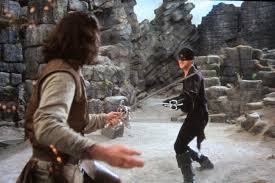
(From “The Princess Bride”, Written and adapted for the screen by William Goldman, 1987)
“Where justice is denied, where poverty is enforced, where ignorance prevails, and where any one class is made to feel that society is an organized conspiracy to oppress, rob and degrade them, neither persons nor property will be safe.”
― Frederick Douglass
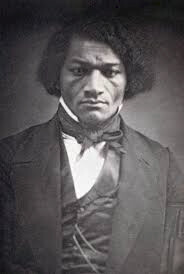
(Frederick Douglass)
“If you tremble with indignation at every injustice then you are a comrade of mine.”
― Ernesto Che Guevara

(Ernesto Che Guevara)
“Justice will not be served until those who are unaffected are as outraged as those who are.”
― Benjamin Franklin
“There exists in man a mass of sense lying in a dormant state, and which, unless something excites it to action, will descend with him, in that condition, to the grave.”
― From “The Rights of Man”, by Thomas Paine, 1791
“It is never to be expected in a revolution that every man is to change his opinion at the same moment. There never yet was any truth or any principle so irresistibly obvious that all men believed it at once. Time and reason must cooperate with each other to the final establishment of any principle; and therefore those who may happen to be first convinced have not a right to persecute others, on whom conviction operates more slowly. The moral principle of revolutions is to instruct, not to destroy.”
From “Dissertation on First-principles of Government”, by Thomas Paine, 1795
“To be good is noble; but to show others how to be good is nobler, and no trouble.
- Mark Twain
“I love the man that can smile in trouble, that can gather strength from distress, and grow brave by reflection. 'Tis the business of little minds to shrink; but he whose heart is firm, and whose conscience approves his conduct, will pursue his principles unto death.”
― Thomas Paine
"O for a man who is a man, and, as my neighbor says, has a bone in his back which you cannot pass your hand through!”
From “Civil Disobedience”, by Henry David Thoreau, 1849
“On evil’s cushion poised, His Majesty,
Satan Thrice-Great, lulls our charmed soul, until
He turns to vapor what was once our will:
Rich ore, transmuted by his alchemy.”
― Baudelaire
“Open confession of dictatorship is far less dangerous than sham democracy. One can defend oneself against the former; the latter is like a creeper attached to the body of a drowning man.”
― From “The Mass Psychology of Fascism”, by Wilhelm Reich, 1933
(Former U.K. Prime Minister Boris Johnson, U.S. Presidential candidate Hillary Clinton and former U.S. President Donald Trump, all making the same purportedly secret Masonic “gestures of recognition”.)
“The Grecians and Romans were strongly possessed of the spirit of liberty but not the principle, for at the time they were determined not to be slaves themselves, they employed their power to enslave the rest of mankind.”
~ Thomas Paine
“Princes and governments are far more dangerous than other elements within society.”
- Niccolo Machiavelli
"The fact that political ideologies are tangible realities is not a proof of their vitally necessary character. The bubonic plague was an extraordinarily powerful social reality, but no one would have regarded it as vitally necessary. ”
― Wilhelm Reich
"A people that elect corrupt politicians, imposters, thieves and traitors are not victims… but accomplices.”
― George Orwell
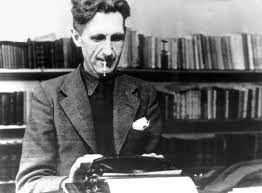
(George Orwell)
“The citizen who thinks he sees that the commonwealth’s political clothes are worn out, and yet holds his peace and does not agitate for a new suit, is disloyal, he is a traitor. That he may be the only one who thinks he sees this decay, does not excuse him: it is his duty to agitate anyway, and it is the duty of others to vote him down if they do not see the matter as he does.”
- Mark Twain
“It was one of the greatest errors in evaluating dictatorship to say that the dictator forces himself on society against its own will. In reality, every dictator in history was nothing but the accentuation of already existing state ideas which he had only to exaggerate in order to gain power.”
― From “The Mass Psychology of Fascism”, by Wilhelm Reich, 1933
“Unless a man becomes the enemy of an evil, he will not even become its slave but rather its champion.”
― G.K. Chesterton
“France will rise again. You shall see.”
“Rise?—with this burden of English armies on her back!”
“She will cast it off; she will trample it under foot!” This with spirit.
“Without soldiers to fight with?”
“The drums will summon them. They will answer, and they will march.”
“March to the rear, as usual?”
“No; to the front—ever to the front—always to the front! You shall see.”
“And the pauper King?”
“He will mount his throne—he will wear his crown.”
“Well, of a truth this makes one’s head dizzy. Why, if I could believe that in thirty years from now the English domination would be broken and the French monarch’s head find itself hooped with a real crown of sovereignty—”
“Both will have happened before two years are sped.”
“Indeed? and who is going to perform all these sublime impossibilities?”
“God.”
It was a reverent low note, but it rang clear.
What could have put those strange ideas in her head? This question kept running in my mind during two or three days. It was inevitable that I should think of madness. What other way was there to account for such things? Grieving and brooding over the woes of France had weakened that strong mind, and filled it with fantastic phantoms—yes, that must be it.
But I watched her, and tested her, and it was not so. Her eye was clear and sane, her ways were natural, her speech direct and to the point. No, there was nothing the matter with her mind; it was still the soundest in the village and the best. She went on thinking for others, planning for others, sacrificing herself for others, just as always before. She went on ministering to her sick and to her poor, and still stood ready to give the wayfarer her bed and content herself with the floor. There was a secret somewhere, but madness was not the key to it. This was plain."
From “Personal Recollections of Joan of Arc”, by Mark Twain, 1896
“Here you go, Larry. See what happens? You see what happens, Larry?! See what happens?! This is what happens when you fuck a stranger in the ass, Larry! [Proceeds to smash up what he wrongly believes is Larry’s new Corvette] This is what happens, Larry! See what happens, Larry?! Do you see what happens when you fuck a stranger in the ass, this is what happens! See what happens, Larry?! You see what happens, Larry?! Do you see what happens, Larry, when you fuck a stranger in the ass?! This is what happens, Larry! This is what happens, Larry!”
Walter Sobchak, from “The Big Lebowski”, by Joel and Ethan Coen, 1998
(John Goodman and Jeff Bridges in “The Big Lebowski”, 1998 - note Bridges’ Satanic purple shirt, as well as the purportedly-secret Illuminist “gestures of recognition” that he’s making with his hands.)
“On glancing over my notes of the seventy odd cases in which I have during the last eight years studied the methods of my friend Sherlock Holmes, I find many tragic, some comic, a large number merely strange, but none commonplace; for, working as he did rather for the love of his art than for the acquirement of wealth, he refused to associate himself with any investigation which did not tend towards the unusual, and even the fantastic.”
― From “The Adventure of the Speckled Band”, by Sir Arthur Conan Doyle, 1892
“I am not the law, but I represent justice so far as my feeble powers go.”
― Sherlock Holmes, from “The Adventure of the Three Gables”, by Sir Arthur Conan Doyle, 1926
“And don’t get hurt,’ [Dexter] added. 'There’s no one to help you up there. And don’t go stirring up a lot of trouble for us. This case isn’t ripe yet. Until it is, our policy with Mr. Big is ‘live and let live’.”
Bond looked quizzically at Captain Dexter.
“In my job,’ he said, 'when I come up against a man like this one, I have another motto. It’s ‘live and let die’.”
From “Live and Let Die”, by Ian Fleming, 1954
“You have probably never heard of Professor Moriarty?” said he.
“Never.”
“Aye, there’s the genius and the wonder of the thing!” he cried. “The man pervades London, and no one has heard of him. That’s what puts him on a pinnacle in the records of crime. I tell you, Watson, in all seriousness, that if I could beat that man, if I could free society of him, I should feel that my own career had reached its summit, and I should be prepared to turn to some more placid line in life. Between ourselves, the recent cases in which I have been of assistance to the royal family of Scandinavia, and to the French republic, have left me in such a position that I could continue to live in the quiet fashion which is most congenial to me, and to concentrate my attention upon my chemical researches. But I could not rest, Watson, I could not sit quiet in my chair, if I thought that such a man as Professor Moriarty were walking the streets of London unchallenged.”
From “The Memoirs of Sherlock Holmes - The Final Problem”, by Sir Arthur Conan Doyle, 1894
“There is nothing noble in being superior to your fellow man; true nobility is being superior to your former self.”
- Ernest Hemingway
“Every person of learning is finally his own teacher.”
- Thomas Paine
“We have now sunk to a depth at which the restatement of the obvious is the first duty of intelligent men.”
- George Orwell
"Good is always getting better and bad is always getting worse: the possibilities of even apparent neutrality are always diminishing. The whole thing is sorting itself out all the time, coming to a point, getting sharper and harder.”
From “That Hideous Strength”, by C.S. Lewis, 1945
Wikipedia – “Don’t be evil” is the motto of Google’s corporate code of conduct, first introduced around 2000.
October 4, 2015 – Google Parent Company Drops ‘Don’t Be Evil’ Motto
October 5, 2015 – Why Google Was Smart To Drop Its “Don’t Be Evil” Motto
March 8, 2018 – How Google Is Part of the Government and Can Censor Anyone
“In keeping silent about evil, in burying it so deep within us that no sign of it appears on the surface, we are implanting it, and it will rise up a thousand fold in the future. When we neither punish nor reproach evildoers, we are not simply protecting their trivial old age, we are thereby ripping the foundations of justice from beneath new generations.”
― From “The Gulag Archipeligo”, by Aleksandr I. Solzhenitsyn, 1973
“I became convinced that noncooperation with evil is as much a moral obligation as is cooperation with good.”
― From “The Autobiography of Martin Luther King, Jr.”, by Clayborne Carson, 1998
“Tolerance becomes a crime when applied to evil.”
From “The Magic Mountain”, by Thomas Mann, 1924
“The common people, on the whole, are still living in the world of absolute good and evil from which the intellectuals have long since escaped.”
– George Orwell
“I suppose there are two views about everything.”
“Eh? Two views? There are a dozen views about everything until you know the answer. Then there’s never more than one.”
From “That Hideous Strength”, by C.S. Lewis, 1945
Meanwhile back in Queens the realness and foundation
If I die, I couldn’t choose a better location
When the slugs penetrate, you feel a burnin’ sensation
Take these words home and think it through
Or the next rhyme I write might be about you
Son, they shook
'Cause ain’t no such things as halfway crooks
Scared to death, scared to look, they shook
'Cause ain’t no such things as halfway crooks
Scared to death, scared to look
From “Shook Ones (Part II)”, by Mobb Deep, 1994
“I need not pause to explain that crime is not a disease. It is criminology that is a disease.”
― From “Eugenics and Other Evils: An Argument Against the Scientifically Organized State”, by G.K. Chesterton, 1922
"A totalitarian state is in effect a theocracy, and its ruling caste, in order to keep its position, has to be thought of as infallible. But since, in practice, no one is infallible, it is frequently necessary to rearrange past events in order to show that this or that mistake was not made, or that this or that imaginary triumph actually happened.
A totalitarian society which succeeded in perpetuating itself would probably set up a schizophrenic system of thought, in which the laws of common sense held good in everyday life and in certain exact sciences, but could be disregarded by the politician, the historian, and the sociologist.”
― From “The Prevention of Literature”, by George Orwell, 1946
"It was in part due to the influence of Polybius on Montesquieu’s Spirit of the Laws (1748) that Polybius came to the attention of the Founding Fathers of the United States. Thomas Jefferson once thought the Histories important enough that he sent a copy to James Madison at the Constitutional Convention in 1787, although his attitude toward Polybius probably shifted as his own views inclined more in the direction of a strongly based democratic form of government. The most ardent admirer of Polybius’s theory of the mixed constitution was John Adams. In the year following the drafting of the US Constitution, while in London, he published A Defense of the Constitutions of Government of the United States of America, in which he strongly argued in support of the classical theory of a mixed government. The work consists of fifty-five letters on a variety of subjects relating to this theory, two of which (30 and 31) are devoted to Polybius. He argued that in fact it was possible to improve on Polybius’s idea state by dividing the legislative branch in two and segregating the more powerful elements of society:
‘The only remedy is to throw the rich and the proud into one group, in a separate assembly, and there tie their hands; if you give them scope with the people at large, or their representatives, they will destroy all equality and liberty, with the consent and acclamations of the people themselves. They will have much more power, mixed with the representatives, than separated from them. In the first case, if they unite, they will give the law, and govern all; if they differ, they will divide the state, and go to decision by force. By placing them alone by themselves, the society avails itself of all their abilities and virtues; they become a solid check to the representatives, themselves, as well as to the executive power, and you disarm them entirely of the power to do mischief’."
From “The Oxford Anthology of Roman Literature”, Edited by Peter E. Knox and J.C. McKeown, 2013
"It is in refusing to recognize that we worship something that we move from the worship ‘of’ that thing to slavery ‘to’ that thing.”
― Craig D. Lounsbrough
“The emotional qualities are antagonistic to clear reasoning.”
Sherlock Holmes, from “The Sign of the Four”, by Sir Arthur Conan Doyle, 1890
“Before anything can be reasoned upon to a conclusion, certain facts, principles, or data, to reason from, must be established, admitted, or denied.”
- Thomas Paine
“Data! data! data!" he cried impatiently. "I can’t make bricks without clay.”
― Sherlock Holmes, from “The Adventure of the Copper Beeches”, by Sir Arthur Conan Doyle, 1892
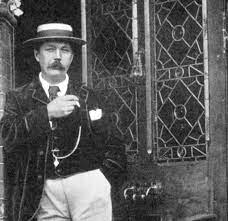
(Sir Arthur Conan Doyle)
“I offer nothing more than simple facts, plain arguments, and common sense.”
- Thomas Paine
“The real man smiles in trouble, gathers strength from distress, and grows brave by reflection.”
― Thomas Paine
“Nature that framed us of four elements, warring within our breasts for regiment, doth teach us all to have aspiring minds.”
- Niccolo Machiavelli
“Education never ends, Watson. It is a series of lessons, with the greatest for the last.”
Sherlock Holmes, from “His Last Bow”, by Sir Arthur Conan Doyle, 1917
“It is necessary to the happiness of man that he be mentally faithful to himself. Infidelity does not consist in believing, or in disbelieving, it consists in professing to believe what he does not believe.”
From “The Age of Reason”, by Thomas Paine, 1794
“The man who lies to himself and listens to his own lie comes to such a pass that he cannot distinguish the truth within him, or around him, and so loses all respect for himself and for others. And having no respect he ceases to love, and in order to occupy and distract himself without love he gives way to passions and coarse pleasures, and sinks to bestiality in his vices, all from continual lying to other men and to himself.”
From “The Brothers Karamazov”, by Fyodor Dostoevsky, 1880
“Cathy’s lies were never innocent. Their purpose was to escape punishment, or work, or responsibility, and they were used for profit. Most liars are tripped up either because they forget what they have told or because the lie is suddenly faced with an incontrovertible truth. But Cathy did not forget her lies, and she developed the most effective method of lying. She stayed close enough to the truth so that one could never be sure. She knew two other methods also – either to interlard her lies with truth or to tell a truth as though it were a lie. If one is accused of a lie and it turns out to be the truth, there is a backlog that will last a long time and protect a number of untruths.”
― From “East of Eden”, by John Steinbeck, 1952
“The hardest tumble a man can take is to fall over his own bluff.”
― Ambrose Bierce
“The most formidable weapon against errors of every kind is reason. I have never used any other, and I trust I never shall.”
― Thomas Paine
“And many another proof can I adduce
To scrape up credit for my arguments.
But to a mind keen-scented these small traces
Suffice: from them you’ll grasp the rest yourself.
As mountain-ranging hounds find by their scent
The lair of beast in leafy covert hid
Once they have got some traces of its track,
So one thing after another you by yourself
Will find that you can see, in these researches,
And penetrate all unseen hiding places
And draw the truth from them.”
From “On the Nature of the Universe”, by Lucretius, 94 B.C. to 53 B.C.
“All truth passes through three stages. First, it is ridiculed. Second, it is violently opposed. Third, it is accepted as being self-evident.”
- Arthur Schopenhauer
“It is error only, and not truth, that shrinks from inquiry.”
― Thomas Paine
“Build your house on granite. By granite I mean your nature that you are torturing to death, the love in your child’s body, your wife’s dream of love, your own dream of life when you were sixteen. Exchange your illusions for a bit of truth. Throw out your politicians and diplomats! Take your destiny into your own hands and build your life on rock. Forget about your neighbor and look inside yourself! Your neighbor, too, will be grateful. Tell your fellow workers all over the world that you’re no longer willing to work for death but only for life."
From “Listen Little Man”, by Wilhelm Reich, 1948
“Never tell the truth to people who are not worthy of it.”
― Mark Twain
“If you look for truth, you may find comfort in the end; if you look for comfort you will not get either comfort or truth only soft soap and wishful thinking to begin, and in the end, despair.”
― C.S. Lewis
“The truth must be quite plain, if one could just clear away the litter.”
From “A Caribbean Mystery”, by Agatha Christie, 1964
“And the truth must finally lie in that which every oppressed individual feels within himself but hasn’t the courage to express.”
From “Beyond Psychology: Letters and Journals”, by Wilhelm Reich, 1934-1939
“Freedom had been hunted round the globe; reason was considered as rebellion; and the slavery of fear had made men afraid to think. But such is the irresistible nature of truth, that all it asks, — and all it wants, — is the liberty of appearing."
From “The Rights of Man”, by Thomas Paine, 1791
“You should not honor men more than truth.”
― Plato
“Thirst was made for water; inquiry for truth.”
From “The Great Divorce”, by C.S. Lewis, 1945
“However much you deny the truth, the truth goes on existing.”
- George Orwell
“Facts do not cease to exist because they are ignored.”
― Aldous Huxley, from “Complete Essays, Vol. II”, 1926-1929
“How often have I said to you that when you have eliminated the impossible, whatever remains, however improbable, must be the truth?”
Sherlock Holmes, from “The Sign of the Four”, by Sir Arthur Conan Doyle, 1890
“When men yield up the privilege of thinking, the last shadow of liberty quits the horizon.”
― Thomas Paine
“When the mob and the press and the whole world tell you to move. Your job is to plant yourself like a tree beside the river of truth and tell the whole world: “No, you move.”
― Mark Twain
“It takes two to speak the truth - one to speak and another to hear.”
― Henry David Thoreau
“There are two ways to be fooled. One is to believe what isn’t true. The other is to refuse to believe what is true.”
- Soren Kierkegaard
“In wartime, truth is so precious that she should always be attended by a bodyguard of lies.”
― Winston S. Churchill
“Force and fraud are in war the two cardinal virtues.”
― Thomas Hobbes
“The whole secret lies in confusing the enemy, so that he cannot fathom our real intent.”
― From “The Art of War”, by Sun Tzu, 5th Century B.C.
“History is a set of lies agreed upon.”
― Napoleon Bonaparte
Without the power to put them into practice, truths are of no use. They remain academic.
Power, no matter what kind of power it is, without a foundation in truth, is a dictatorship, more or less and in one way or another, for it is always based on man’s fear of the social responsibility and personal burden that “freedom” entails.
Dictatorial power and truth do not go together. They are mutually exclusive.
From “The Mass Psychology of Fascism”, by Wilhelm Reich, 1933
“Thinking is man’s only basic virtue, from which all the others proceed. And his basic vice, the source of all his evils, is that nameless act which all of you practice, but struggle never to admit: the act of blanking out, the willful suspension of one’s consciousness, the refusal to think - not blindness, but the refusal to see; not ignorance, but the refusal to know. It is the act of unfocusing your mind and inducing an inner fog to escape the responsibility of judgment - on the unstated premise that a thing will not exist if only you refuse to identify it, that A will not be A so long as you do not pronounce the verdict ‘It is.”
― From “Atlas Shrugged”, by Ayn Rand, 1957
“The less he understands something, the more firmly he believes in it.”
From “Listen, Little Man!”, by Wilhelm Reich, 1946
“Fables should be taught as fables, myths as myths, and miracles as poetic fancies. To teach superstitions as truths is a most terrible thing. The child mind accepts and believes them, and only through great pain and perhaps tragedy can he be in after years relieved of them. In fact, men will fight for a superstition quite as quickly as for a living truth — often more so, since a superstition is so intangible you cannot get at it to refute it, but truth is a point of view, and so is changeable.”
― Hypathia of Alexandria
“When one with honeyed words but evil mind persuades the mob, great woes befall the state.”
― From “Orestes”, by Euripides, 408 B.C.
“What you see and what you hear depends a great deal on where you are standing. It also depends on what sort of person you are.”
From “The Magician’s Nephew“, by C.S. Lewis, 1955
“It is impossible to calculate the moral mischief, if I may so express it, that mental lying has produced in society. When a man has so far corrupted and prostituted the chastity of his mind as to subscribe his professional belief to things he does not believe he has prepared himself for the commission of every other crime.”
- Thomas Paine
“We are all capable of believing things which we know to be untrue, and then, when we are finally proved wrong, impudently twisting the facts so as to show that we were right.”
― George Orwell
"Not merely the validity of experience, but the very existence of external reality was tacitly denied by their philosophy. The heresy of heresies was common sense.”
From “1984”, by George Orwell, 1949
“It is of the essence of any party to gain its orientation not from truths but from illusions which usually correspond to the irrational mass structure. Scientific truths only interfered with the habit of the party politicians of avoiding difficulties with the aid of illusions.”
From “The Mass Psychology of Fascism”, by Wilhelm Reich, 1933
“The Party told you to reject the evidence of your eyes and ears. It was their final, most essential command.”
― From “1984”, by George Orwell, 1949
“A long habit of not thinking a thing wrong gives it a superficial appearance of being right.”
- Thomas Paine
"The keyword here is BLACKWHITE. Like so many Newspeak words, this word has two mutually contradictory meanings. Applied to an opponent, it means the habit of impudently claiming that black is white, in contradiction of the plain facts. Applied to a Party member, it means a loyal willingness to say that black is white when Party discipline demands this. But it means also the ability to BELIEVE that black is white, and more, to KNOW that black is white, and to forget that one has ever believed the contrary.”
― From “1984”, by George Orwell, 1949
“Doublethink lies at the very heart of Ingsoc, since the essential act of the Party is to use conscious deception while retaining the firmness of purpose that goes with complete honesty.”
From “1984”, by George Orwell, 1949
“Doublethink means the power of holding two contradictory beliefs in one’s mind simultaneously, and accepting both of them.”
From “1984”, by George Orwell, 1949
“The Ministry of Peace concerns itself with war, the Ministry of Truth with lies, the Ministry of Love with torture and the Ministry of Plenty with starvation. These contradictions are not accidental, nor do they result from from ordinary hypocrisy: they are deliberate exercises in doublethink.”
- From “1984”, by George Orwell, 1949
Between 2005 and 2014, California’s South Coast Air Quality Management District did not perform any extensive checks of air quality.
“That was the ultimate subtlety: consciously to induce unconsciousness, and then, once again, to become unconscious of the act of hypnosis you had just performed. Even to understand the word ‘doublethink’ involved the use of doublethink.”
George Orwell, from “1984”, 1949
“The lesson of George Orwell’s ‘1984’ is to trust leaders, the press, and experts.”
- Hillary Clinton, September 2017
“Doublethink is the act of simultaneously accepting two mutually contradictory beliefs as correct, often in distinct social contexts.”
- Wikipedia
“We control matter because we control the mind. Reality is inside the skull.”
O’Brien, from “1984” by George Orwell, 1949
“If you are untrustworthy, people will not trust you.”
― Lao Tzu
“I trust no one, not even myself.”
- Joseph Stalin
“It’s good to trust others but, not to do so is much better.”
- Benito Mussolini
“To see what is in front of one’s nose needs a constant struggle.”
― George Orwell
“The world is full of obvious things which nobody by any chance ever observes.”
From “The Hound of the Baskervilles”, by Sir Arthur Conan Doyle, 1902
“Good intelligence work, Control had always preached, was gradual and rested on a kind of gentleness.”
From “Tinker, Tailor, Soldier, Spy”, by John Le Carre, 1974
“By George!" cried the inspector. “How did you ever see that?”
"Because I looked for it.”
From “The Adventure of the Dancing Men”, by Sir Arthur Conan Doyle, 1903
“A nation under a well-regulated government, should permit none to remain uninstructed. It is monarchical and aristocratical government only that requires ignorance for its support.”
Thomas Paine
“Reason obeys itself; and ignorance submits to whatever is dictated to it.”
― Thomas Paine
“Ignorance is of a peculiar nature; once dispelled, it is impossible to reestablish it. It is not originally a thing of itself, but it is only the absence of knowledge; and though man may be kept ignorant, he may not be made ignorant.”
- Thomas Paine
“In the period of 2010-2014, twelve new fish species have been recorded in the Adriatic Sea. Certain fish species were probably related to recent processes in the Adriatic Sea, such as bioinvasion and tropicalisation.”
- Frontiers in Marine Science, 2015
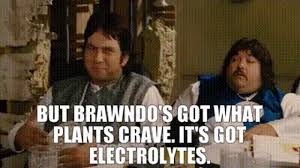
(“But Brawndo’s got what plants crave. It’s got Electrolytes.” From “Idiocracy”, by Mike Judge, 2006)
“Orthodoxy means not thinking–not needing to think. Orthodoxy is unconsciousness.”
― From “1984”, by George Orwell, 1949
“His education had had the curious effect of making things that he read and wrote more real to him than things he saw.”
From “That Hideous Strength“, by C.S. Lewis, 1945
“The truest way to be deceived is to think oneself more knowing than others.”
― From “Maxims” by Francois de La Rochefoucauld, 1678
“There are some ideas so absurd that only an intellectual could believe them.”
- George Orwell
“Why you fool, it’s the educated reader who CAN be gulled. All our difficulty comes with the others. When did you meet a workman who believes the papers? He takes it for granted that they’re all propaganda and skips the leading articles. He buys his paper for the football results and the little paragraphs about girls falling out of windows and corpses found in Mayfair flats. He is our problem. We have to recondition him. But the educated public, the people who read the high-brow weeklies, don’t need reconditioning. They’re all right already. They’ll believe anything.”
From “That Hideous Strength”, by C.S. Lewis, 1945
“I am a skeptic…Global warming has become a new religion.”
Ivar Giaever, Nobel Prize Winner for Physics
“Since I am no longer affiliated with any organization nor receiving any funding, I can speak quite frankly…As a scientist I remain skeptical…The main basis of the claim that man’s release of greenhouse gases is the cause of the warming is based almost entirely upon climate models. We all know the frailty of models concerning the air-surface system.”
Atmospheric Scientist Dr. Joanne Simpson, the first woman in the world to receive a PhD in meteorology, and formerly of NASA, who has authored more than 190 studies and has been called “among the most preeminent scientists of the last 100 years
“What one man can invent, another can discover.”
Sherlock Holmes, from “The Adventure of the Dancing Men”, by Sir Arthur Conan Doyle, 1903
“He believed that anything could be reverse-engineered. If one human or group of humans put something together, then another human or group of humans could take it apart again. It was a basic principle. All that was required was empathy and thought and imagination. And he liked pressure. He liked deadlines. He liked a short and finite time to crack a problem. He liked a quiet space to work in. And he liked a similar mind to work with.”
From “The Hard Way”, by Lee Child, 2006
“It is by tracing things to their origin, that we learn to understand them; and it is by keeping that line and that origin always in view, that we never forget them.”
― From “Common Sense, The Rights of Man and Other Essential Writings”, by Thomas Paine, 1776
“I have already explained to you that what is out of the common is usually a guide rather than a hindrance. In solving a problem of this sort, the grand thing is to be able to reason backwards. That is a very useful accomplishment, and a very easy one, but people do not practise it much. In the every-day affairs of life it is more useful to reason forwards, and so the other comes to be neglected. There are fifty who can reason synthetically for one who can reason analytically.”
Sherlock Holmes, from “A Study in Scarlet”, by Sir Arthur Conan Doyle, 1887
“My name is Sherlock Holmes. It is my business to know what other people do not know.”
From “The Adventure of the Blue Carbuncle“, by Sir Arthur Conan Doyle, 1892
“And if you don’t know, now you know, nigga”
From “Juicy”, by Christopher George Latore Wallace, aka Biggie Smalls, aka Notorious B.I.G., 1994
“Never trust to general impressions, my boy, but concentrate yourself upon details.”
Sherlock Holmes, from “The Adventures of Sherlock Holmes”, by Sir Arthur Conan Doyle, 1892
“One can fool some men, or fool all men in some places and times, but one cannot fool all men in all places and ages.”
Jacques Abbadie, 1684
“One may outwit another, but not all the others.”
― François de La Rochefoucauld
“My hate is general, I detest all men;
Some because they are wicked and do evil,
Others because they tolerate the wicked,
Refusing them the active vigorous scorn
Which vice should stimulate in virtuous minds.”
― From “The Misanthrope”, by Moliere, 1666

(Coincidence theorists refuse to believe that Donald Trump and Hillary Clinton both read teleprompters, and that their facial expressions are not accidental. You need to understand Kabuki theater)

(Japanese Kabuki Theater “Demon” mask)
“Almost all people are hypnotics. The proper authority saw to it that the proper belief should be induced, and the people believed properly.”
― Charles Fort
“Madness is something rare in individuals — but in groups, parties, peoples, and ages, it is the rule.”
― From “Beyond Good and Evil”, by Friedrich Nietzsche, 1886
"I know your race. It is made up of sheep. It is governed by minorities. Seldom or never by majorities. It suppresses its feelings and beliefs and follows the handful that makes the most noise. Sometimes the noisy handful is right. Sometimes wrong. But no matter, the crowd follows it. The vast majority of the race, whether savage or civilized are secretly kindhearted, and shrink from inflicting pain. But in the presence of the aggressive and pitiless minority they don’t dare to assert themselves.”
From “The Mysterious Stranger”, by Mark Twain, 1916
“It didn’t come from the Government down. There was no dictum, no declaration, no censorship, to start with, no! Technology, mass exploitation, and minority pressure carried the trick, thank God.”
― From “Fahrenheit 451”, by Ray Bradbury, 1953
“The mob is the most ruthless of tyrants”
― From “The Anti-Christ”, by Friedrich Nietzsche, 1895
“Society can and does execute its own mandates: and if it issues wrong mandates instead of right, or any mandates at all in things with it ought not to meddle, it practices a social tyranny more formidable than many kinds of political oppression, since, though not usually upheld by such extreme penalties, it leaves fewer means of escape, penetrating much more deeply into the details of life, and enslaving the soul itself.”
― From “On Liberty”, by John Stuart Mill, 1859

(Crowd wearing surgical masks)

(Group of young women on their smartphones)
“To argue with a man who has renounced the use and authority of reason, and whose philosophy consists in holding humanity in contempt, is like administering medicine to the dead, or endeavoring to convert an atheist by scripture.”
― From “The American Crisis”, by Thomas Paine, 1777
“That there are men in all countries who get their living by war, and by keeping up the quarrels of Nations is as shocking as it is true…”
― Thomas Paine
"We laugh at honor and are shocked to find traitors in our midst.”
From “The Abolition of Man”, by C.S. Lewis, 1943
"Common sense will tell us, that the power which hath endeavoured to subdue us, is of all others, the most improper to defend us.”
― From “Common Sense”, by Thomas Paine, 1776
“If I spared my native land, and did not defile and dishonor my good repute by laying hands on a tyranny of cruel violence, I feel no shame at all; for in this way I believe that I shall win a greater triumph - over all mankind.”
From the Iambic Tetrameter “To Phokos”, by Solon, Greece, 640-560 B.C.
“A body of men holding themselves accountable to nobody ought not to be trusted by anybody.”
― Thomas Paine
“The masses never revolt of their own accord, and they never revolt merely because they are oppressed. Indeed, so long as they are not permitted to have standards of comparison, they never even become aware that they are oppressed.”
― From “1984”, by George Orwell, 1949
"It was in part due to the influence of Polybius on Montesquieu’s Spirit of the Laws (1748) that Polybius came to the attention of the Founding Fathers of the United States. Thomas Jefferson once thought the Histories important enough that he sent a copy to James Madison at the Constitutional Convention in 1787, although his attitude toward Polybius probably shifted as his own views inclined more in the direction of a strongly based democratic form of government. The most ardent admirer of Polybius’s theory of the mixed constitution was John Adams. In the year following the drafting of the US Constitution, while in London, he published A Defense of the Constitutions of Government of the United States of America, in which he strongly argued in support of the classical theory of a mixed government. The work consists of fifty-five letters on a variety of subjects relating to this theory, two of which (30 and 31) are devoted to Polybius. He argued that in fact it was possible to improve on Polybius’s idea state by dividing the legislative branch in two and segregating the more powerful elements of society:
‘The only remedy is to throw the rich and the proud into one group, in a separate assembly, and there tie their hands; if you give them scope with the people at large, or their representatives, they will destroy all equality and liberty, with the consent and acclamations of the people themselves. They will have much more power, mixed with the representatives, than separated from them. In the first case, if they unite, they will give the law, and govern all; if they differ, they will divide the state, and go to decision by force. By placing them alone by themselves, the society avails itself of all their abilities and virtues; they become a solid check to the representatives, themselves, as well as to the executive power, and you disarm them entirely of the power to do mischief’."
From “The Oxford Anthology of Roman Literature”, Edited by Peter E. Knox and J.C. McKeown, 2013
“He was a fattish but active man of paralyzing stupidity, a mass of imbecile enthusiasm—one of those completely unquestioning, devoted drudges on whom, more even than on the Thought Police, the stability of the Party depended.”
From “1984”, by George Orwell, 1949
"My Dear Burrough,
As you describe me I can picture myself as I was, 22 years ago. The portrait is correct. You think I have grown some; upon my word there was room for it. You have described a callow fool, a self-sufficient ass, a mere human tumble-bug, stern in air, heaving at his bit of dung & imagining he is re-modeling the world & is entirely capable of doing it right. Ignorance, intolerance, egotism, self-assertion opaque perception, dense & pitiful chuckle-headedness - & an almost pathetic unconsciousness of it all. That is what I was at 19-20; & that is what the average Southerner is at 60 to-day. Northerners, too, of a certain grade. It is of children like this that voters are made. And such is the primal source of our government! A man hardly knows whether to swear or cry over it."
Mark Twain, in a letter to Jacob H. Burrough, 1 November 1876, Hartford, Connecticticut, when Twain was 41
Narrator: The number one movie was called: Ass. And that’s all it was for 90 minutes. It won eight Oscars that year including best screenplay.
From “Idiocracy”, by Mike Judge, 2006
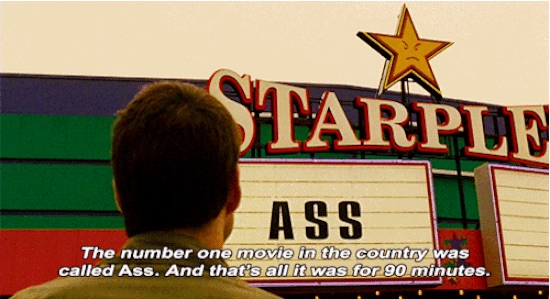
(“The number one movie in the country was called Ass. And that’s all it was for 90 minutes.” From “Idiocracy”, by Mike Judge, 2006)
“The vulgar crowd always is taken by appearances, and the world consists chiefly of the vulgar.”
― From “The Prince” by Niccolò Machiavelli, 1532
“She said that she was working for the ABC News. It was as much of the alphabet as she knew how to use.”
From “Brilliant Mistake”, by Elvis Costello, 1986
"In a way, the world−view of the Party imposed itself most successfully on people incapable of understanding it. They could be made to accept the most flagrant violations of reality, because they never fully grasped the enormity of what was demanded of them, and were not sufficiently interested in public events to notice what was happening. By lack of understanding they remained sane. They simply swallowed everything, and what they swallowed did them no harm, because it left no residue behind, just as a grain of corn will pass undigested through the body of a bird.”
From “1984”, by George Orwell, 1949
“The hardest thing to explain is the glaringly evident which everybody has decided not to see.”
From “The Fountainhead”, by Ayn Rand, 1943
“The world is full of obvious things which nobody by any chance ever observes.”
― From “The Hound of the Baskervilles”, by Sir Arthur Conan Doyle, 1902
“They are pleased to deceive themselves, as if they deceived Fate at the same time.”
― Seneca, On the Shortness of Life
“Men are so simple and so much inclined to obey immediate needs that a deceiver will never lack victims for his deceptions.”
- Niccolo Machiavelli
“Mundus vult decipi’—the world wants to be deceived. To live without deception presupposes standards beyond the reach of most people whose existence is largely shaped by compromise, evasion and mutual accommodation. Could they face their weakness, their vanity and selfishness, without a mask?”
― Abraham Joshua Heschel
“When a person cannot deceive himself the chances are against his being able to deceive other people.”
- Mark Twain
“No evil dooms us hopelessly except the evil we love, and desire to continue in, and make no effort to escape from. ”
― From “Daniel Deronda”, by George Eliot, 1876
“Don’t worry about your father. He’s a perfectly contented, self-sufficient zombie.”
From “Bluebeard”, by Kurt Vonnegut, 1987
(People on their smartphones while walking)
“Imaginary evil is romantic and varied; real evil is gloomy, monotonous, barren, boring. Imaginary good is boring; real good is always new, marvelous, intoxicating.”
― Simone Weil
She was so good lookin’
Wonderin’ what she was cookin’
It smelled so good
She had an old suitcase
Full of skulls
She kissed my lips
My blood ran cold
I couldn’t wait to give my soul but
She didn’t want it
She’s a zombie
She’s a zombie and it’s true
She’s a zombie through and through
From “She’s a Zombie”, by Langhorne Slim, 2017
“There will be, in the next generation or so, a pharmacological method of making people love their servitude, and producing dictatorship without tears, so to speak, producing a kind of painless concentration camp for entire societies, so that people will in fact have their liberties taken away from them, but will rather enjoy it, because they will be distracted from any desire to rebel by propaganda or brainwashing, or brainwashing enhanced by pharmacological methods. And this seems to be the final revolution.”
― Aldous Huxley
(Zombie Apocalypse: what we think it looks like (mob of zombies), what it really looks like (smiling young people on smartphones)
Roughly one in five smart phone users will become addicted and have serious behavioral problems.
The suicide rate in the ten highest smart phone penetration nations is 50% higher than that in ten lowest smart phone penetration nations.
From 1999 to 2018, the increase in suicide has been twice as large among women as it has been among men.
The number of women who use their phones more than 6 hours a day is twice that of men who did the same.
“Demons are like obedient dogs; they come when they are called.”
Remy de Gourmont
“Now the Elves made many rings; but secretly Sauron made One Ring to rule all the others, and their power was bound up with it, to be subject wholly to it and to last only so long as it too should last. And much of the strength and will of Sauron passed into that One Ring; for the power of the Elven-rings was very great, and that which should govern them must be a thing of surpassing potency; and Sauron forged it in the Mountain of Fire in the Land of Shadow. And while he wore the One Ring he could perceive all the things that were done by means of the lesser rings, and he could see and govern the very thoughts of those that wore them.”
From “The Silmarillion”, by J.R.R. Tolkien, Edited and published posthumously by his son, Christopher Tokien in 1977

(Jim Carrey in Satanic purple and green as the Riddler in “Batman Forever”, 1995 - he’s taking in the brain waves his purpose-built set-top box has stolen from unwitting television viewers. They’re kidding, kidding!)

(The Internet in 1995)
“The shadow of that hyddeous strength, sax myle and more it is of length”
From “Ane Dialog”, by Sir David Lyndsay, describing the Tower of Babel, 1555 (The quote introduces C.S. Lewis’ “That Hideous Strength”, from 1945)
Three Rings for the Elven-kings under the sky,
Seven for the Dwarf-lords in their halls of stone,
Nine for Mortal Men doomed to die,
One for the Dark Lord on his dark throne
In the Land of Mordor where the Shadows lie.
One Ring to rule them all, One Ring to find them,
One Ring to bring them all, and in the darkness bind them,
In the Land of Mordor where the Shadows lie.
From “The Fellowship of the Ring”, by J.R.R. Tolkien, 1954
But suddenly the mirror went altogether dark, as dark as if a hole had opened in the world of sight, and Frodo looked into emptiness. In the black abyss there appeared a single Eye that slowly grew, until it filled nearly all the Mirror. So terrible was it that Frodo stood rooted, unable to cry out or to withdraw his gaze. The Eye was rimmed with fire, but was itself glazed, yellow as a cat’s, watchful and intent, and the black slit of its pupil opened on a pit, a window into nothing.
Then the Eye began to rove, searching this way and that; and Frodo knew with certainty and horror that among the many things that it sought he himself was one. But he also knew that it could not see him - not yet, not unless he willed it. The Ring that hung upon its chain about his neck grew heavy, heavier than a great stone, and his head was dragged downwards. The Mirror seemed to be growing hot and curls of steam were rising from the water. He was slipping forward…
‘I know what it is you last saw,’ she said; ‘for that is also in my mind. do not be afraid! But do not think that only by singing amid the trees, nor even by the slender arrows of elvenbows, is this land of Lothlórien maintained and defended against the Enemy. I say to you, Frodo, that even as I speak to you, I perceive the Dark Lord and know his mind, or all his mind that concerns the Elves. And he gropes ever to see me and my thought. But still the door is closed!’
From “The Fellowship of the Ring”, by J.R.R. Tolkien, 1954

(Happy young girls with smartphones)
A Canadian Medical Association study from February 2020 found that excess smartphone and social media use were linked to mental distress and suicide risk, and that 54% of US teens were addicted to their smartphones.
From 2000 to 2018, the US suicide for women of all ages in the United States increased by 50%.
In 2020, a study in 2020 showed that living in cities is associated with a doubling of schizophrenia, an almost 40% higher risk of depression, and over 20% more anxiety. That same month, a study of Chinese adults ages 65 and older showed that living in urban areas later in life is associated with better initial cognitive status but a faster rate of cognitive decline.
It’s the higher level of Death energy in the ether in urban areas that drives those numbers. Moral and mental health vary directly with that of the subject’s etheric environment.
‘You say the ring is dangerous, far more dangerous than I guess. In what way?’
‘In many ways,’ answered the wizard. 'It is far more powerful than I ever dared to think at first, so powerful that in the end it would utterly overcome anyone of mortal race who possessed it. It would possess him.’
From “The Fellowship of the Ring”, by J.R.R. Tolkien, 1954
All I see turns to brown
As the sun burns the ground
And my eyes fill with sand
As I scan this wasted land
Try to find, try to find what I feel
Oh, pilot of the storm who leaves no trace
Like thoughts inside a dream
Heed the path that led me to that place, yellow desert stream
My Shangri-La beneath the summer moon, I will return again
Sure as the dust that floats high in June, when movin’ through Kashmir
Oh, father of the four winds, fill my sails, across the sea of years
With no provision but an open face, along the straits of fear
From “Kashmir”, by Led Zeppelin, 1973
Cold be hand and heart and bone
and cold be sleep under stone
never more to wake on stony bed
never, till the Sun fails and the Moon is dead
In the black wind the stars shall die
and still be gold here let them lie
till the Dark Lord lifts his hand over dead sea and withered land
The Barrow-wight, from “The Fellowship of the Ring”, by J.R.R. Tolkien, 1954
The history of civilization is record of struggles against the progressive desiccation of civilized lands. The more ancient the civilization, the drier and more wasted, usually, is the supporting country. In fact, so devastating seems the occupation of man that, with a few striking exceptions, a desert or near-desert condition is often associated with his long habitation of a region . Two major factors are believed to account for the growth of man-made deserts. In the first place, semi-arid to semi-humid regions proved the most favorable sites for the development of human culture. Such areas, however, stand in a condition of delicate ecological balance between humid and true desert climates. Comparatively slight disturbances of the cover of vegetation and soils, such as are brought about by human occupation for grazing and cultivation, are sufficient to extend the borders of the desert far beyond the natural true desert into more humid climates.
From “Man-Made Deserts”, by W.C. Lowdermilk, 1935
“Why does reversing deserts and curing deadly diseases seem to enrage these hiding human tapeworms and liver flukes so much? That’s something to ponder but it might be that unless we’re parasites, ourselves, we won’t be able to answer it.”
- Don Croft, February 5, 2014
Inside the flat a fruity voice was reading out a list of figures which had something to do with the production of pig-iron. The voice came from an oblong metal plaque like a dulled mirror which formed part of the surface of the right-hand wall. Winston turned a switch and the voice sank somewhat, though the words were still distinguishable. The instrument (the telescreen, it was called) could be dimmed, but there was no way of shutting it off completely.
From “1984”, by George Orwell, 1949

(Man with smartphone attached to his head)
It was terribly dangerous to let your thoughts wander when you were in any public place or within range of a telescreen. The smallest thing could give you away. A nervous tic, an unconscious look of anxiety, a habit of muttering to yourself – anything that carried with it the suggestion of abnormality, of having something to hide. In any case, to wear an improper expression on your face (to look incredulous when a victory was announced, for example) was itself a punishable offense. There was even a word for it in Newspeak: facecrime, it was called.
From “1984”, by George Orwell, 1949
“There will come a time when it isn’t ‘They’re spying on me through my phone’ anymore. Eventually, it will be ‘My phone is spying on me’.”
― Philip K. Dick, sometime prior to his death in 1982
He took his scribbling pad on his knee and pushed back his chair so as to get as far away from the telescreen as possible. To keep your face expressionless was not difficult, and even your breathing could be controlled, with an effort: but you could not control the beating of your heart, and the telescreen was quite delicate enough to pick it up.
From “1984”, by George Orwell, 1949
He rose deliberately from his chair and came towards them across the soundless carpet. A little of the official atmosphere seemed to have fallen away from him with the Newspeak words, but his expression was grimmer than usual, as though he were not pleased at being disturbed. The terror that Winston already felt was suddenly shot through by a streak of ordinary embarrassment. It seemed to him quite possible that he had simply made a stupid mistake. For what evidence had he in reality that O’Brien was any kind of political conspirator? Nothing but a flash of the eyes and a single equivocal remark: beyond that, only his own secret imaginings, founded on a dream. He could not even fall back on the pretence that he had come to borrow the dictionary, because in that case Julia’s presence was impossible to explain. As O’Brien passed the telescreen a thought seemed to strike him. He stopped, turned aside and pressed a switch on the wall. There was a sharp snap. The voice had stopped.
Julia uttered a tiny sound, a sort of squeak of surprise. Even in the midst of his panic, Winston was too much taken aback to be able to hold his tongue.
‘You can turn it off!’ he said.
‘Yes,’ said O’Brien, ‘we can turn it off. We have that privilege.’
From “1984”, by George Orwell, 1949
“Sauron was become now a sorcerer of dreadful power, master of shadows and of phantoms, foul in wisdom, cruel in strength, misshaping what he touched, twisting what he ruled, lord of werewolves; his dominion was torment.”
From “The Silmarillion”, by J.R.R. Tolkien, published posthumously by Christopher Tolkien, 1977
"I think the SSmart phone is ‘walking point’ - I think that if one were to try to protect one’s self from whatever it is that’s driving the massive increase in suicide, that turning off that high-powered, next-to-skull delivery mechanism would be a good first step. But I think it’s just the Primary Delivery Mechanism within a large suite of things leading to that behavioral moment, that across-the-globe suicide increase, mortality increase, et al.
It’s not just phones, it’s the general DOR level in the environment, created, concentrated and enhanced by the tower network. Those who never picked up a SSmart phone are bathed in it, surrounded by it. There’s the low-lifeforce diet, there’s the weaponized-food diet, there’s injections of vaccines containing aluminum and God knows what else. There’s low-fat diets (afflicting moreso the females), starving the 80%-cholesterol brain, wasting the neurons throughout the body, depriving them of their basic substance.
I feel as if my brief foray into SSmart phone penetration and the phenomena we’re investigating shows correlation. My guess is that a saturation point, a tipping point has to be reached, in both the individual and within the larger environment they inhabit. But my conclusion is just a guess, at this point. And of course correlation strongly implies but does not confirm causation."
Jeff Miller private e-mail to Don Croft, 2017
"I wonder if it’s possible to see whether the suicides have common factors, such as corporate-food diet (obesity/starvation), enslavement to the pharma cartel, smartphones, low intelligence, conformity addiction, etc. Those seem related to me, sort of like how welfare moms generally have huge, expensive TVs. Perhaps low intelligence and ‘social networking’ on a smartphone are directly correlated.
The more data you compile the clearer this will become and I think it’s worth pursuing but just broaching the subject is a pioneering effort. One of Israel’s minor prophets said, ‘My people perish for lack of knowledge.’ It reminds me a bit of all the activists who still die of fast cancer and energy weaponry because they don’t know about zappers and orgonite. The herd-mentality masses are even farther from applying solutions. I’ve had to remind a lot of intelligent associates to use a zapper after getting poisoned after they forgot and did stints in hospitals. Three of the Africans died in those circumstances in 2008. That’s not happening much, these days–quite a relief."
Don Croft private e-mail to Jeff Miller, 2017
“The world is full of magic things, patiently waiting for our senses to grow sharper.”
― W.B. Yeats
Yes me friend, me friend, me friend
Dem set me free again
The bars could not hold me
Force could not control me now
From “Duppy Conqueror”, by Bob Marley, 1973
(In Jamaican, “duppy” means “ghost” - ed)
“Only the existence of a field of force can account for the motions of the bodies observed, and its assumption dispenses with space curvature. All literature on this subject is futile and destined for oblivion. So are all attempts to explain the workings of the universe without recognizing the evidence of the ether and the indispensable function in the phenomena. My second discovery was of a physical truth of the greatest importance. As I have searched the entire scientific records in more than a half dozen languages for a long time without the least anticipation, I consider myself the original discoverer of this truth, which can be expressed by the statement: there is no energy in matter other than that received from the environment.”
- Nicola Tesla
“Materialism can no longer claim to be a scientific philosophy.”
From “Janus: A Summing Up”, by Arthur Koestler, 1978
“Materialism’s first deadly legacy is the rejection of reason and objective truth. Nineteenth-century materialists depicted our thoughts as the irrational products of environment or heredity or brain chemistry. As a consequence, the intellectual classes became convinced that only the reality was material, and thus the only true explanations were reductive. If you wanted to explain a flower, you described its cell structure, not its beauty. If you wanted to explain human beings, you looked not to their greatest achievements, but to the raw materials that made them up. This sort of reductionism permeates contemporary society, from politics and the social sciences to literature and the performing arts.”
From “C.S. Lewis and Materialism”, by John G. West, August 2, 2012
“If you want to find the secrets of the universe, think in terms of energy, frequency and vibration.”
- Nicola Tesla
“There is something which unites magic and applied science while separating both from the “wisdom” of earlier ages. For the wise men of old the cardinal problem had been how to conform the soul to reality, and the solution had been knowledge, self-discipline, and virtue. For magic and applied science alike the problem is how to subdue reality to the wishes of men: the solution is a technique; and both, in the practice of this technique, are ready to do things hitherto regarded as disgusting and impious.”
—From “The Abolition of Man”, by C.S. Lewis, 1943
“The day science begins to study non-physical phenomena, it will make more progress in one decade than in all the previous centuries of its existence.”
- Nicola Tesla
-
“Immortal” and indestructible" surround all and direct all.
-
Existing opposites are separated from the unity.
-
Animals come into being through vapors raised by the sun.
-
Man, however, came into being by another animal, namely the fish, for at first he was like a fish.
-
The soul is like air in its nature.
From “On Nature”, by Anaximander, Greece, 560 B.C.
“In Oceania at the present day, Science, in the old sense, has almost ceased to exist… The empirical method of thought, on which all the scientific achievements of the past were founded, is opposed to the most fundamental principles of Ingsoc. And even technological progress only happens when its products can in some way be used for the diminution of human liberty.”
“There is something fascinating about science. One gets such wholesale returns of conjecture out of such a trifling investment of fact.”
― From “Life on the Mississippi”, by Mark Twain, 1883
BEDEMIR: What also floats in water?
VILLAGER #1: Bread!
VILLAGER #2: Apples!
VILLAGER #3: Very small rocks!
VILLAGER #1: Cider!
VILLAGER #2: Great gravy!
VILLAGER #1: Cherries!
VILLAGER #2: Mud!
VILLAGER #3: Churches – churches!
VILLAGER #2: Lead – lead!
ARTHUR: A duck.
CROWD: Oooh.
BEDEMIR: Exactly!
BEDEMIR: Who are you, who are so wise in the way of science?
ARTHUR: I am Arthur, King of the Britons
From “Monty Python and the Holy Grail”, written by John Cleese, Terry Gilliam, Graham Chapman, Eric Idle, Terry Jones and Michael Palin, 1973
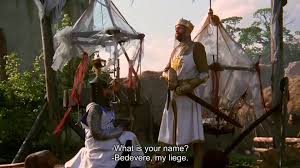
(Graham Chapman as Arthur and Terry Jones as Bedemir discussing science, in “Monty Python and the Holy Grail”, 1975)
“The first principle of value that we need to rediscover is this: that all reality hinges on moral foundations. In other words, that this is a moral universe, and that there are moral laws of the universe just as abiding as the physical laws.
― From “Rediscovering Lost Values”, by Martin Luther King Jr., 1954
"Yet mad I am not…and very surely do I not dream.”
― From “The Black Cat”, by Edgar Allan Poe, 1843
“I believe that mycelium is the neurological network of nature. Interlacing mosaics of mycelium infuse habitats with information-sharing membranes. These membranes are aware, react to change, and collectively have the long-term health of the host environment in mind. The mycelium stays in constant molecular communication with its environment, devising diverse enzymatic and chemical responses to complex challenges.”
― From “Mycelium Running: How Mushrooms Can Help Save the World”, by Paul Stamets, 2005
RAY: Mr. Mayor, we are here tonight because a psychomagnotheric slime flow of immense proportions is building beneath the city.
EGON: Negative human emotions are materializing in the form of a viscous, psychoreactive plasm with explosive supernormal potential.
From “Ghostbusters II”, written by Dan Ackroyd and Harold Ramis, 1989
(The Ghostbusters examine the psychomanotheric slime flow beneath New York)
Delbert Grady: Your son has a very great talent. I don’t think you are aware how great it is. That he is attempting to use that very talent against your will.
Jack Torrance: He is a very willful boy.
Delbert Grady: Indeed he is, Mr. Torrance. A very willful boy. A rather naughty boy, if I may be so bold, sir.
Jack Torrance: It’s his mother. She, uh, interferes.
Delbert Grady: Perhaps they need a good talking to, if you don’t mind my saying so. Perhaps a bit more. My girls, sir, they didn’t care for the Overlook at first. One of them actually stole a pack of matches, and tried to burn it down. But I “corrected” them sir. And when my wife tried to prevent me from doing my duty, I “corrected” her.
From the script of the film “The Shining”, written by Stanley Kubrick, Diane Johnson, and Stephen King, 1980
The incidence of schizophrenia is 100% higher in cities than it is in rural areas.
The incidence of mental disorder or insanity is 82% higher in areas near the center of the city, vs. the residential sections near the outskirts.
The incidence of psychosis is 77% higher in urban areas than in rural areas.
The depression rate is 40% higher in cities than it is in rural areas.
The rate of cognitive decline is 32% faster in cities than in rural areas.
The incidence of Alzheimer’s disease is 6-19% higher in cities than it is in rural areas.
That’s because moral and mental health vary directly with that of the subject’s etheric environment.
“Let them call me rebel and welcome, I feel no concern from it; but I should suffer the misery of devils, were I to make a whore of my soul by swearing allegiance to one whose character is that of a sottish, stupid, stubborn, worthless, brutish man.”
― From “The Crisis”, by Thomas Paine, 1775
“If I spared my native land, and did not defile and dishonor my good repute by laying hands on a tyranny of cruel violence, I feel no shame at all; for in this way I believe that I shall win a greater triumph - over all mankind.”
From the Iambic Tetrameter “To Phokos”, by Solon, Greece, 640-560 B.C.
‘How came you to know of this?’ he cried. And then, with some return of his truculent manner: ‘What business is it of yours?’
‘My name is Sherlock Holmes,’ said my companion. ‘Possibly it is familiar to you. In any case, my business is that of every other good citizen - to uphold the law. It seems to me that you have much to answer for.’
Sir Robert glared for a moment, but Holmes’s quiet voice and cool, assured manner had their effect.
From “The Adventure of Shoscombe Olde Place”, by Sir Arthur Conan Doyle, published in Liberty Magazine, 1927
“It is the duty of every man, as far as his ability extends, to detect and expose delusion and error.”
– Thomas Paine
“Bond looked at the beautiful day and smiled. And no man, not even Mr. Big, would have liked the expression on his face.”
― From “Live and Let Die”, by Ian Fleming, 1954
(Sean Connery, as James Bond in “Goldfinger”, 1965). (Jeff Miller, Brooklyn, New York, 2020)
Ringo: “Which wallet is yours?”
Jules: "It’s the one that says ‘Bad Motherfucker’ ".
From “Pulp Fiction”, by Quentin Tarantino, 1994
(Samuel L. Jackson, as Jules, with “Bad Motherfucker” wallet, from “Pulp Fiction”, by Quentin Tarentino, 1994)
“Mr Bond, they have a saying in Chicago: ‘Once is happenstance. Twice is coincidence. The third time it’s enemy action’.”
From “Goldfinger”, by Ian Fleming, 1959
From Dr. Watson’s summary list of Sherlock Holmes’s strengths and weaknesses:
-
Knowledge of Anatomy: Accurate but unsystematic.
-
Knowledge of Sensational Literature: Immense. He appears to know every detail of every horror perpetrated in the century.
-
Plays the violin well.
-
Is an expert singlestick player, boxer, and swordsman.
-
Has a good practical knowledge of British law.
From “A Study in Scarlet”, by Sir Arthur Conan Doyle, 1887
“I have already explained to you that what is out of the common is usually a guide rather than a hindrance. In solving a problem of this sort, the grand thing is to be able to reason backwards. That is a very useful accomplishment, and a very easy one, but people do not practise it much. In the every-day affairs of life it is more useful to reason forwards, and so the other comes to be neglected. There are fifty who can reason synthetically for one who can reason analytically.”
Sherlock Holmes, from “A Study in Scarlet”, by Sir Arthur Conan Doyle, 1887
“You know my method. It is founded upon the observation of trifles.”
Sherlock Holmes, from “The Boscombe Valley Mystery”, by Sir Arthur Conan Doyle, 1891
“They say that genius is an infinite capacity for taking pains," he remarked with a smile. "It’s a very bad definition, but it does apply to detective work.”
From “A Study in Scarlet”, by Sir Arthur Conan Doyle, 1887
“The larger crimes are apt to be the simpler, for the bigger the crime, the more obvious, as a rule, is the motive.”
From “The Adventures of Sherlock Holmes – A Case of Identity”, by Sir Arthur Conan Doyle, 1892
"I like a good detective story myself. Lots of nonsense written, though. Criminal discovered in last Chapter. Everyone dumbfounded. Real crime - you’d know at once.”
― Miss Howard, from “The Mysterious Affair at Styles”, by Agatha Christie, 1920
“Commit a crime, and the earth is made of glass.”
― Ralph Waldo Emerson
“The criminal is the creative artist; the detective only the critic.”
― From “The Blue Cross: A Father Brown Mystery”, by G.K. Chesterton, The Blue Cross: A Father Brown Mystery, 1910
END OF PART ONE
Jeff Miller, Brooklyn, New York, March 12, 2021
If you’d like to be added to this free mailing list, or know someone who would be, please send me a note at [email protected]
You can access these articles online at https://forum.orgones.co.uk/c/positive-changes-that-are-occurring/






